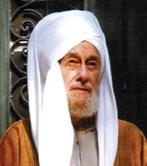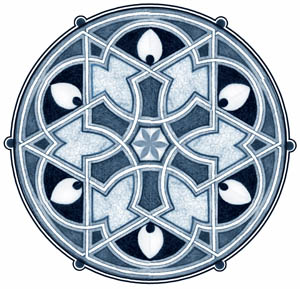Jean-Louis Michon | |
|---|---|
| Born | 13 April 1924 |
| Died | 22 February 2013 [1] [2] Geneva, Switzerland |
| Other names | Ali Abd al-Khaliq |
| Academic background | |
| Influences | René Guénon, [3] Frithjof Schuon, [3] Titus Burkhardt, [3] Martin Lings, [3] Seyyed Hossein Nasr [3] |
| Academic work | |
| School or tradition | Traditionalism,Perennial Philosophy,Sufism |
| Main interests | Esoterism,Sufism,Quran,Islamic culture and arts,Traditionalism,Perennial Philosophy |
| Notable works | Ibn Ajiba:Two Treatises on the Oneness of Existence (Archetype,2010);The Moroccan Sufi Ibn 'Ajiba and His Mi'raj,(Fons Vitae,1998) |
Jean-Louis Michon (13 April 1924 - 22 February 2013) was a French traditionalist and translator who specialized in Islamic art and Sufism. He worked extensively with the United Nations to preserve the cultural heritage of Morocco.
Born in Nancy,France,in 1924,Michon was in college at the advent of WWII. There he began studying religion with a group of fellow students.
I understood that if I wanted to go to God and practice very serious ways, the only way [in Catholicism] was to become a monk. And I had no vocation to be a monk… So I just waited until something appeared. [4]
Already having two diplomas, (one in law, one in English literature), he moved to Paris and enrolled in a program for political science.
This something appeared in the guise of the works of French Traditionalist René Guénon. Greatly moved by Guénon’s writings, Michon felt the need to enter an initiatic tradition. Michon had a great personal affinity with Hinduism and Buddhism; particularly Zen Buddhism after reading the essays of D.T. Suzuki. [4] He longed to travel to Japan to find a Zen master, but Japan was currently at war with his country.
One day in April 1945, I heard on the radio that a corps of French paratroopers was being trained, under US military assistance, to be sent to Japan. At once my decision was made! I signed up as a GI for the duration of the war. My intention was, as soon as I touched Japanese ground, using the few words I had collected from my readings; to set out in search of Satori. I entered the army just as one enters a convent; certain that God would not abandon me and would direct me to a Master. [4]
After four months of training, and a few days before the date set for departure to Japan, the atomic bomb was dropped and Japan capitulated. He returned to school to take his final exams and it was there in the school library that he read in La Revue Africaine an article on the late Sufi master Sheikh Ahmad al-Alawi (who had died over a decade before). The article, entitled Mystic Modernist, mentioned that the late Sheikh had initiated several European disciples into the Sufi tradition. The next day Michon began attending prayers at the mosques, and, with the help of Michel Valsan, he converted to Islam (with the name Ali Abd al-Khaliq). [4]
In 1946 he was offered a position in Damascus as an English teacher, which he took with an idea of furthering his studies in Islam. In 1949 he apprenticed to an architect draftsman and moved to Lausanne. There he lived for many years next door to Frithjof Schuon and his wife. In 1953 he married the ex-wife of Leo Schaya. The Crow medicine man Thomas Yellowtail later adopted both Michon and his wife into the Crow tribe. After marriage and the birth of a daughter, Solange, he began a career with a variety of United Nations agencies, first as a freelance editor and translator and finally, over a period of fifteen years (1957–1972), as a permanent senior translator for the World Health Organization in Geneva. It was also during this period that Michon obtained a PhD in Islamic studies at Paris University (Sorbonne). His thesis was on the life and works of a scholar and spiritual guide of great renown from the north of Morocco, Shaykh Ahmad Ibn ‘Ajībah al-Hasanī (1747–1809), whose Autobiography (Fahrasa) and Glossary of Technical Terms of Sufism (Mi‘raj al-tashawwuf ilā haqā’iq al-tasawwuf) Michon translated from Arabic into French (1982; 1974 and 1990). Michon’s French translation of the Fahrasa of Ibn ‘Ajībah has been translated into English by David Streight (1999). Between 1970 and 1973 he participated to the Istituto Ticinese di Alti Studi in Lugano (Switzerland). [5] [ verification needed ] In 2010 his edition of two treatises of Ibn Ajiba was published by Archetype, Cambridge, in a bi-lingual volume in English (translated by David Streight) and Arabic.
In July 1946 Michon traveled to Lausanne to be initiated by the disciple of Sheikh al-Alawi, Frithjof Schuon. In attendance was Martin Lings (with whom he became particularly close).
During Michon’s first trip to Switzerland he traveled to Basel where he met two of Schuon’s closest disciples (and prominent members of the Traditionalist School); Titus Burckhardt and Leo Schaya.
Over Easter in 1947 he visited Guénon at his home, meeting his wife Fatima and children.
When asked what message he would give the next generation, he replied:
"To my contemporaries, those of all the generations, I will say - prepare yourself to the encounter with God. It is He who has granted us an invaluable gift – intelligence – which man alone possesses among all created beings. Intelligence is the link with Him; it runs all our physic and bodily faculties. And if turned towards the Supreme Lord, lit by its light, it gives to any one of us the possibility to know himself better and to direct himself towards what is good for him." [4]
From 1972 to 1980 Michon was the Chief Technical Advisor to the Moroccan government on UNESCO projects for the preservation of the cultural heritage. He was part of an effort to coordinate the rehabilitation of traditional handicrafts that were endangered by industrialization. He was also greatly involved in the preservation and restoration of the casbahs of Morocco as part of a project designed to protect the city of Fez. [6]
He was also a contributor to the quarterly journal, Studies in Comparative Religion, which dealt with religious symbolism and the Traditionalist perspective.

Frithjof Schuon was a Swiss metaphysician of German descent, belonging to the Perennialist or Traditionalist School of thought. He was the author of more than twenty works in French on metaphysics, spirituality, religion, anthropology and art, which have been translated into English and many other languages. He was also a painter and a poet.

The Traditionalist or Perennialist School is a group of 20th- and 21st-century thinkers who believe in the existence of a perennial wisdom or perennial philosophy, primordial and universal truths which form the source for, and are shared by, all the major world religions.

The Shadhili Order is a tariqah or Sufi order of Sunni Islam founded by al-Shadhili in the 13th century and is followed by millions of people around the world. Many followers of the Shadhili Order are known as Shadhilis, and a single follower is known as Shadhili.

Martin Lings, also known as Abū Bakr Sirāj ad-Dīn, was an English writer, Islamic scholar, and philosopher. A student of the Swiss metaphysician Frithjof Schuon and an authority on the work of William Shakespeare, he is best known as the author of Muhammad: His Life Based on the Earliest Sources, first published in 1983 and still in print.

William Stoddart is a Scottish physician, author and "spiritual traveller", who has written several books on the Perennial Philosophy and on comparative religion.

Titus Burckhardt was a Swiss writer and a leading member of the Perennialist or Traditionalist School. He was the author of numerous works on metaphysics, cosmology, anthropology, esoterism, alchemy, Sufism, symbolism and sacred art.

Sufi studies is a particular branch of comparative studies that uses the technical lexicon of the Islamic mystics, the Sufis, to exemplify the nature of its ideas; hence the frequent reference to Sufi Orders. It may be divided into two main branches, the orientalist/academic and the spiritual.

Aḥmad ibn Muḥammad ibn ʿAjība al-Ḥasanī was an influential 18th-century Moroccan scholar and poet in the Sunni Darqawa Sufi lineage.

Ivan Aguéli, also named Shaykh ʿAbd al-Hādī al-ʿAqīlī upon his conversion to Islam, was a Swedish wandering Sufi, painter and author. As a devotee of Ibn Arabi, his metaphysics applied to the study of Islamic esotericism and its similarities with other esoteric traditions of the world. He was one of the initiators of René Guénon into Sufism and founder of the Parisian Al Akbariyya society. His art was a unique form of miniature Post-Impressionism where he used the blend of colours to create a sense of depth and distance. His unique style of art made him one of the founders of the Swedish contemporary art movement.

Ahmad al-Alawi, in full Abū al-ʿAbbās Aḥmad ibn Muṣṭafā ibn ʿAlīwa, known as al-ʿAlāwī al-Mustaghānimī, was an Algerian Sufi Sheikh who founded his own Sufi order, called the Alawiyya.
Michel Valsan was a Muslim scholar and master of a Shadhiliyya tariqah in Paris under the name Shaykh Mustafa 'Abd al-'Aziz. As well, he was a Romanian diplomat and a prolific translator who specialized in translating and interpreting the works of the Sufi theoretician Ibn Arabi.

Kurt Almqvist (1912–2001) was a Swedish poet, intellectual and spiritual figure, representative of the Traditionalist School and the Perennial philosophy.
Kenneth "Harry" Oldmeadow is an Australian academic, author, editor and educator whose works focus on religion, tradition, traditionalist writers and philosophy.
Leo Schaya (1916–1985) was a Swiss author and scholar whose works focused on the Sufi tradition, the Kabbalah, and the Traditionalist School.

Whitall Nicholson Perry was an American author born in Belmont, Massachusetts, member of the Perennialist School, which is based primarily on the work of René Guénon, Ananda Coomaraswamy and Frithjof Schuon. Perry’s major opus, A Treasury of Traditional Wisdom, is a compilation of thousands of quotations from all the great religious and esoteric traditions, supported by commentaries.

Akbari Sufism or Akbarism is a branch of Sufi metaphysics based on the teachings of Ibn Arabi, an Andalusian Sufi who was a gnostic and philosopher. The word is derived from Ibn Arabi's nickname, "Shaykh al-Akbar," meaning "the greatest master." 'Akbariyya' or 'Akbaris' have never been used to indicate a specific Sufi group or society. It is now used to refer to all historical or contemporary Sufi metaphysicians and Sufis influenced by Ibn Arabi's doctrine of Wahdat al-Wujud. It is not to be confused with Al Akbariyya, a secret Sufi society founded by Swedish Sufi 'Abdu l-Hadi Aguéli.

The Matheson Trust is an educational charity based in London dedicated to further and disseminate the study of comparative religion, especially from the point of view of the underlying harmony of the major religious and philosophical traditions of the world.
Donald Macleod Matheson CBE (1896–1979) was Secretary to the National Trust from 1934 to 1945. Active within the Traditionalist School as a translator and author, he founded The Matheson Trust for the study of comparative religion.

The Reign of Quantity and the Signs of the Times is a 1945 book by the French intellectual René Guénon, in which the author offers a comprehensive explanation, based on tradition, of the cyclical conditions that led to the modern world in general and to the Second World War in particular. The book was published with the support of Jean Paulhan from Gallimard, who created a collection exclusively dedicated to "Tradition" in order to publish Guénon.
Victor Danner was a Mexican-American author, researcher, and translator specializing in comparative religion and Islamic mysticism.
(includes photos of Dr. Michon with René Guénon and Martin Lings)